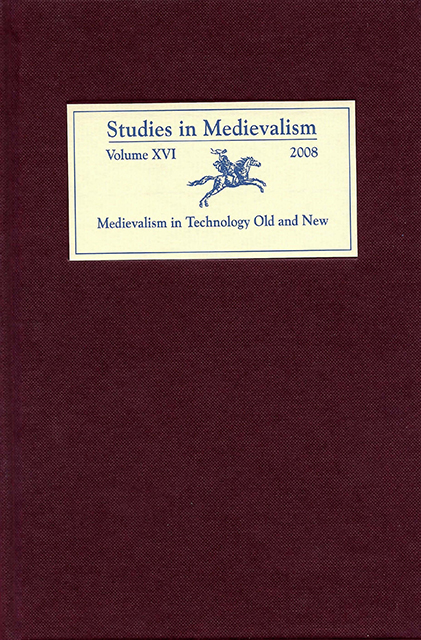Book contents
- Frontmatter
- Studies in Medievalism
- Acknowledgments
- Contents
- Volume XVI 2008
- Illustrations
- Editorial Note
- Contes du Style des Troubadours: The Memory of the Medieval in Seventeenth-Century French Fairy Tales
- A Ritual Failure: The Eglinton Tournament, the Victorian Medieval Revival, and Victorian Ritual Culture
- An Eastern Medieval Revival: Byzantine Art and Nineteenth-Century French Painting
- I Am Weary of That Foolish Tale: Yeatss Revision of Tennysons Idylls and Ideals in Time and the Witch Vivien
- The Doughboy Comes to Chartres: Stars and Stripes and the Middle Ages
- Constructing Difference: The Guidonian Hand and the Musical Space of Historical Others
- An Introduction to Medievalist Video Games
- Medieval and Pseudo-Medieval Elements in Computer Role-Playing Games: Use and Interactivity
- Romancing the Game: Magic, Writing, and the Feminine in Neverwinter Nights
- Revising the Future: The Medieval Self and the Sovereign Ethics of Empire in Star Wars: Knights of the Old Republic
- Promises of Monsters: The Rethinking of Gender in MMORPGs
- Contributors
Revising the Future: The Medieval Self and the Sovereign Ethics of Empire in Star Wars: Knights of the Old Republic
Published online by Cambridge University Press: 10 March 2023
- Frontmatter
- Studies in Medievalism
- Acknowledgments
- Contents
- Volume XVI 2008
- Illustrations
- Editorial Note
- Contes du Style des Troubadours: The Memory of the Medieval in Seventeenth-Century French Fairy Tales
- A Ritual Failure: The Eglinton Tournament, the Victorian Medieval Revival, and Victorian Ritual Culture
- An Eastern Medieval Revival: Byzantine Art and Nineteenth-Century French Painting
- I Am Weary of That Foolish Tale: Yeatss Revision of Tennysons Idylls and Ideals in Time and the Witch Vivien
- The Doughboy Comes to Chartres: Stars and Stripes and the Middle Ages
- Constructing Difference: The Guidonian Hand and the Musical Space of Historical Others
- An Introduction to Medievalist Video Games
- Medieval and Pseudo-Medieval Elements in Computer Role-Playing Games: Use and Interactivity
- Romancing the Game: Magic, Writing, and the Feminine in Neverwinter Nights
- Revising the Future: The Medieval Self and the Sovereign Ethics of Empire in Star Wars: Knights of the Old Republic
- Promises of Monsters: The Rethinking of Gender in MMORPGs
- Contributors
Summary
When science-fiction computer games imagine the future, they often do so in medieval terms. Set after the fall of empire, many such games present players with dystopian, science-fictional worlds that invariably appropriate the tropes of the medieval romance. Cities, space stations, and planetary outposts stand as pockets of order and stability, centers of government, religion, culture, and trade that simultaneously represent the remnants of the lost empire and the hopes of the new. Yet, as in medieval romance, these technological Camelots are few and far between. Surrounded on all sides by the sprawling chaos and horror of an encroaching, often alien wilderness, they are constantly in jeopardy of being contaminated, overrun, and lost. Strapped into the cockpit of starships and weighed down by armor, shields, and weaponry, players must venture forth to joust against this wilderness, to push it back and, if possible, to recover the sovereign order lost with the collapse of empire. The player's most potent ally in such quests, however, is not the promise of exotic technologies of an alien future, but the chivalric ideals of an imagined medieval past in which the knightly hero fought to regain the glory of ancient times.
While purists differentiate science fiction from fantasy (the critical difference being that, in the former, technology is magic, while in the latter, magic is magic), the two genres are much less distinct in the popular imagination. Some of this blurring may be due to the fact that both genres are equally derived from the shared pedigree of medieval romance. Although Kathryn Hume cautions that the apparent derivation of science fiction from romance is much more complicated than it initially seems, she nevertheless admits that “there is some truth to [the] assumption” that science fiction “bear[s] a similar, if not identical, relationship to the medieval romance: run Guy of Warwick or some Charlemagne chansons through a transformer, and one ought to come up with space opera or space epic.” Of course, not all science fiction is “space opera or space epic,” but this does not necessarily invalidate Hume's point, since much of what Hume observes concerns the relatively recent emergence of space opera as the most widely recognized (and, arguably, predominant) sub-genre of science fiction today.
Coined as a pejorative play on “horse opera,” the phrase “space opera” originally referred to hack Westerns repackaged as science fiction for popular consumption.
- Type
- Chapter
- Information
- Studies in Medievalism XVIMedievalism in Technology Old and New, pp. 159 - 183Publisher: Boydell & BrewerPrint publication year: 2008



